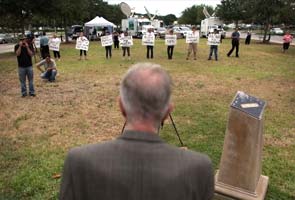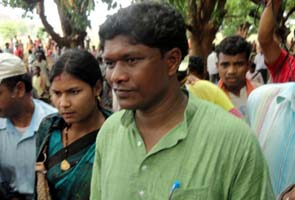Manchester:  Manchester United manager Sir Alex Ferguson accused Roberto Mancini of attempting to influence officials after a furious touchline bust-up with the Manchester City boss on Monday.
Manchester United manager Sir Alex Ferguson accused Roberto Mancini of attempting to influence officials after a furious touchline bust-up with the Manchester City boss on Monday.
Ferguson and Mancini had to be separated during an explosive finger-jabbing confrontation in the 76th minute of a highly charged encounter at Eastlands which saw City take control of the title race with a 1-0 victory.
Ferguson had leapt from his dugout to protest after an ugly challenge from Nigel De Jong on United substitute Danny Welbeck.
The 70-year-old United boss later accused Mancini of harassing officials throughout the title duel.
"Mancini was badgering the ref and the fourth official all game," Ferguson said. "He was complaining about refs all week, but he can't complain about this one."
However Ferguson had few complaints about a defeat which he admitted had left the destiny of the title in City's hands.
"We didn't test their keeper enough really, we started brightly and for the first 15 minutes we dominated, but the longer the half went on we were looking for half-time and the goal came at a bad time for us," Ferguson said.
"I can't complain about the result, they were more of a threat from counter-attacks.
"It was a damaging result, they are in the driving seat and we are up against it. They only need to win to two more games and they win the league, simple as that," said Ferguson, whose side have now taken only four points from a possible 12 in their last four games.
Ferguson was also unhappy with United's defending for City's winning goal, which came when Vincent Kompany headed in a David Silva corner on the stroke of half-time.
"If you lose a goal at a setpiece at this level of football then you only have yourself to blame for that," Ferguson said.
"It was a bad time to concede a goal because there was nothing really happening at the end of the first half."
Mancini meanwhile brushed off the confrontation with Ferguson.
"I was talking with the fourth official, he told me some kind words, I answered him and it finished," said Mancini, who shook hands with Ferguson after the final whistle.
He also laughed off Ferguson's suggestions that he had been attempting to influence the match officials.
"And him? No? He never talks with the referee, no, never," Mancini said sarcastically.
Although City now top the table on goal difference, meaning wins over Newcastle and QPR will virtually assure them of the title, Mancini meanwhile insisted that United were still in a strong position to retain their crown.
"They have easy games -- they play against Swansea and Sunderland. We have Newcastle and QPR. These two teams are strong teams," Mancini said.
"For United it will be easy. But we have two strong teams, Newcastle and QPR -- one plays for the Champions League, one plays for relegation."
"But now it's not finished. If we think its finished we make a big mistake," Mancini added.
Asked what he thought the key to the game had been, Mancini replied: "They wanted to draw. We wanted to win. I think that was the difference."
 Manchester United manager Sir Alex Ferguson accused Roberto Mancini of attempting to influence officials after a furious touchline bust-up with the Manchester City boss on Monday.
Manchester United manager Sir Alex Ferguson accused Roberto Mancini of attempting to influence officials after a furious touchline bust-up with the Manchester City boss on Monday.Ferguson and Mancini had to be separated during an explosive finger-jabbing confrontation in the 76th minute of a highly charged encounter at Eastlands which saw City take control of the title race with a 1-0 victory.
Ferguson had leapt from his dugout to protest after an ugly challenge from Nigel De Jong on United substitute Danny Welbeck.
The 70-year-old United boss later accused Mancini of harassing officials throughout the title duel.
"Mancini was badgering the ref and the fourth official all game," Ferguson said. "He was complaining about refs all week, but he can't complain about this one."
However Ferguson had few complaints about a defeat which he admitted had left the destiny of the title in City's hands.
"We didn't test their keeper enough really, we started brightly and for the first 15 minutes we dominated, but the longer the half went on we were looking for half-time and the goal came at a bad time for us," Ferguson said.
"I can't complain about the result, they were more of a threat from counter-attacks.
"It was a damaging result, they are in the driving seat and we are up against it. They only need to win to two more games and they win the league, simple as that," said Ferguson, whose side have now taken only four points from a possible 12 in their last four games.
Ferguson was also unhappy with United's defending for City's winning goal, which came when Vincent Kompany headed in a David Silva corner on the stroke of half-time.
"If you lose a goal at a setpiece at this level of football then you only have yourself to blame for that," Ferguson said.
"It was a bad time to concede a goal because there was nothing really happening at the end of the first half."
Mancini meanwhile brushed off the confrontation with Ferguson.
"I was talking with the fourth official, he told me some kind words, I answered him and it finished," said Mancini, who shook hands with Ferguson after the final whistle.
He also laughed off Ferguson's suggestions that he had been attempting to influence the match officials.
"And him? No? He never talks with the referee, no, never," Mancini said sarcastically.
Although City now top the table on goal difference, meaning wins over Newcastle and QPR will virtually assure them of the title, Mancini meanwhile insisted that United were still in a strong position to retain their crown.
"They have easy games -- they play against Swansea and Sunderland. We have Newcastle and QPR. These two teams are strong teams," Mancini said.
"For United it will be easy. But we have two strong teams, Newcastle and QPR -- one plays for the Champions League, one plays for relegation."
"But now it's not finished. If we think its finished we make a big mistake," Mancini added.
Asked what he thought the key to the game had been, Mancini replied: "They wanted to draw. We wanted to win. I think that was the difference."


 Miami:
Miami:  Bhubaneswar: Three days after being freed, Odisha's Biju Janata Dal (BJD) MLA from Laxmipur, Jhina Hikaka today said the Maoists are likely to release a fresh audio message which could clear the air over his possible resignation as a legislator.
Bhubaneswar: Three days after being freed, Odisha's Biju Janata Dal (BJD) MLA from Laxmipur, Jhina Hikaka today said the Maoists are likely to release a fresh audio message which could clear the air over his possible resignation as a legislator.
